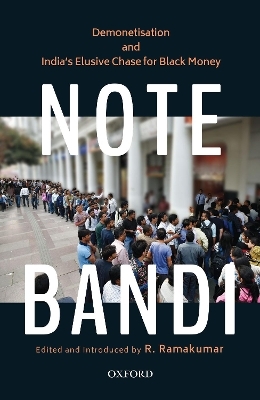
Note-Bandi
Oxford University Press (Verlag)
978-0-19-948679-3 (ISBN)
The demonetisation of November 2016 goes down in history as the day of an intensely debated economic policy intervention of the Indian state. With abolition of the legal tender status of Rs 500 and Rs 1000 notes, about 86 per cent of the currency in circulation stood withdrawn from the economy. The purpose, according to the government, was to stamp out counterfeit currency, unearth black money, and usher in a less-cash economy.
One of the most detailed analysis of demonetisation so far, the book takes on board a large gamut of issues into consideration taking into account data for a larger period of time i.e. till September 2017. The book reviews impact of the demonetisation policy intervention on different spheres of the economy and critically examines each of the major claims of put forth by the government vis-à-vis demonetisation. Through selections from the Economic and Political Weekly, it presents a journey through the Indian black money debate, placing the two demonetisations of 1978 and 2016 within the framework of black money and tax evasion in India over the last six decades
R. Ramakumar is the Dean at the Centre for Study of Developing Economies, School of Development Studies, Tata Institute of Social Sciences, Mumbai. He holds an M.Sc. degree in agricultural economics from Tamil Nadu Agricultural University. He has done his Ph.D. in quantitative economics from the Indian Statistical Institute, Kolkata. Fiscal Policy in India, Development Economics, National Identity Schemes, Agricultural Economics, and Agrarian Studies are some of his areas of research. His current research focuses are on topics like The Aadhar Project in India, Agricultural Credit in India etc.
I. INTRODUCTION
1: R. Ramakumar: A Nation in the Queue: On How Demonetisation Wrecked the Economy and Livelihoods in India
II. DEBATES ON THE SIZE OF THE BLACK ECONOMY
2: Shankar Acharya: Unaccounted Economy in India: A Critical Review of Some Recent Estimates
3: O. P. Chopra: Unaccounted Income Some Estimates
4: Poonam Gupta and Sanjeev Gupta: Estimates of the Unreported Economy in India
5: J. C. Sandesara: Estimates of Black Income: A Critique of Gutmann Method
6: Sacchidananda Mukherjee and R Kavita Rao: Estimating Unaccounted Income in India: Using Transport as a Universal Input
III. BLACK MONEY AND TAX EVASION
III (a) The International Ramifi cations of Tax Evasion
7: Dev Kar: An Empirical Study on the Transfer of Black Money from India: 1948-2008
8: D Ravi Kanth: On a Wild Goose Chase for Black Money in Switzerland 209
9: S. S. S. Kumar: Participatory Note Investments: Do Indian Markets Need Them?
10: Paranjoy Guha Th akurta, Shinzani Jain and Advait Rao Palepu: Did Adani Group Evade Rs 1,000 Crore Taxes?
III (b) The Hindu Undivided Family Act
11: I. S. Gulati: HUF Tax Avoidance Revisited
III (c) Excise Duty Evasion: Case Study
12: Gopinath Pradhan and M. Govinda Rao: Excise Duty Evasion on Cotton Textile Fabrics
III (d) Black Money and Politics
13: Jagdeep S. Chhokar: Black Money and Politics in India
IV. DEMONETISATION AND THE INDIAN ECONOMY
IV (a) The Rationale for Demonetisation
14: J. Dennis Rajakumar and S. L. Shetty: Demonetisation: 1978, the Present and the Aftermath
15: Vineet Kohli and R. Ramakumar: Economic Rationale of Demonetisation
16: Ranjan Sett and Dipak K. Manna: The Problem of Fake Indian Currency Notes: A Process Oriented View
17: C. P. Chandrasekhar: Negative Interest Rates: Symptom of Crisis or Instrument for Recovery
18: Atul Sood and Ashapurna Baruah: The New Moral Economy
IV (b) Theoretical Perspectives
20: Parag Waknis: Demonetisation through Segmented Markets: Some Theoretical Perspectives
IV (c) Impact on the Economy
21: Ashok K. Lahiri: Demonetisation and Cash Shortage
22: Ashok K Nag: Lost Due To Demonetisation
23: P. Sainath: The Cashless Economy of Chikalthana
24: Rahul M: Curry Mixed With Demonetisation and a Pinch of Pesticide
25: R. Mohan: Impact of Demonetisation in Kerala
26: R. Nagaraj: Quarterly GDP Estimation: Can It Pick Up Demonetisation Impact?
27: Ritika Mankar and Sumit Shekhar: Demonetisation and the Delusion of GDP Growth
| Erscheinungsdatum | 04.07.2018 |
|---|---|
| Verlagsort | Oxford |
| Sprache | englisch |
| Maße | 142 x 215 mm |
| Gewicht | 488 g |
| Themenwelt | Wirtschaft ► Betriebswirtschaft / Management ► Finanzierung |
| Betriebswirtschaft / Management ► Spezielle Betriebswirtschaftslehre ► Bankbetriebslehre | |
| Wirtschaft ► Volkswirtschaftslehre ► Finanzwissenschaft | |
| Wirtschaft ► Volkswirtschaftslehre ► Makroökonomie | |
| ISBN-10 | 0-19-948679-4 / 0199486794 |
| ISBN-13 | 978-0-19-948679-3 / 9780199486793 |
| Zustand | Neuware |
| Haben Sie eine Frage zum Produkt? |
aus dem Bereich


